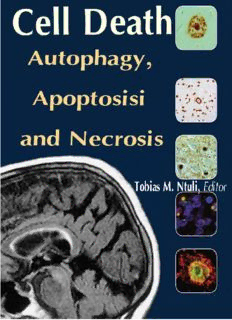
Cell Death: Autophagy, Apoptosisi and Necrosis PDF
Preview Cell Death: Autophagy, Apoptosisi and Necrosis
Cell Death Autophagy, Apoptosisi and Necrosis Edited by Tobias M. Ntuli Cell Death: Autophagy, Apoptosisi and Necrosis Edited by Tobias M. Ntuli Stole src from http://avxhome.se/blogs/exLib/ Published by AvE4EvA Copyright © 2015 All chapters are Open Access distributed under the Creative Commons Attribution 3.0 license, which allows users to download, copy and build upon published articles even for commercial purposes, as long as the author and publisher are properly credited, which ensures maximum dissemination and a wider impact of our publications. After this work has been published, authors have the right to republish it, in whole or part, in any publication of which they are the author, and to make other personal use of the work. Any republication, referencing or personal use of the work must explicitly identify the original source. As for readers, this license allows users to download, copy and build upon published chapters even for commercial purposes, as long as the author and publisher are properly credited, which ensures maximum dissemination and a wider impact of our publications. Notice Statements and opinions expressed in the chapters are these of the individual contributors and not necessarily those of the editors or publisher. No responsibility is accepted for the accuracy of information contained in the published chapters. The publisher assumes no responsibility for any damage or injury to persons or property arising out of the use of any materials, instructions, methods or ideas contained in the book. Publishing Process Manager Technical Editor AvE4EvA MuViMix Records Cover Designer Published December 17, 2015 ISBN-10: 953-51-2236-3 ISBN-13: 978-953-51-2236-4 Спизжено у ExLib: avxhome.se/blogs/exLib C ontents Preface Chapter 1 Autophagy in Cell Fate and Diseases by Daniel Grasso, Alejandro Ropolo and Maria I. Vaccaro Chapter 2 Interconnected Regulation of Apoptosis and WIPI-Mediated Autophagy by Katharina Sporbeck, Fenja Odendall and Tassula Proikas- Cezanne Chapter 3 Autophagy Regulation of the Tumor Immunity – An Old Machinery for a New Function by Tsolere Arakelian, Takouhie Mgrditchian, Elodie Viry, Kris Van Moer, Guy Berchem, Salem Chouaib and Bassam Janji Chapter 4 Targeting the Autophagy Process in Breast Cancer Development and Treatment by Joanna Magdalena Zarzynska Chapter 5 The Role of Autophagy and Apoptosis During Embryo Development by M. Agnello, L. Bosco, R. Chiarelli, C. Martino and M. C. Roccheri Chapter 6 Mitophagy Regulated by the PINK1-Parkin Pathway by Taku Arano and Yuzuru Imai Chapter 7 The Role of Cell Autophagy in Cancer and Its Application in Drug Discovery by Ming Hong, Ning Wang and Yibin Feng Chapter 8 Modulation of Autophagy by Free Fatty Acids by Jiuhui Wang and Daotai Nie Chapter 9 Autophagy as a Therapeutic Target in Gastrointestinal Cancer by Michiko Shintani VI Contents Chapter 10 Apoptotic Molecular Advances in Breast Cancer Management by Pontsho Moela and Lesetja R. Motadi Chapter 11 Between Armour and Weapons — Cell Death Mechanisms in Trypanosomatid Parasites by Rubem Figueiredo Sadok Menna-Barreto and Solange Lisboa de Castro Chapter 12 Apoptosis and Infections by Yorulmaz Hatice Chapter 13 Caspases as Putative Biomarkers of Cervical Cancer Development by Olga V. Kurmyshkina, Pavel I. Kovchur and Tatyana O. Volkova Chapter 14 The Apoptotic Microtubule Network During the Execution Phase of Apoptosis by Manuel Oropesa Ávila, Alejandro Fernández Vega, Juan Garrido Maraver, Marina Villanueva Paz, Isabel De Lavera, Mario De La Mata, Mario D. Cordero, Elizabet Alcocer Gómez, Ana Delgado Pavón, Mónica Álvarez Córdoba, David Cotán and José Antonio Sánchez-Alcázar Chapter 15 Steroidal Saponins and Cell Death in Cancer by María L. Escobar-Sánchez, Luis Sánchez-Sánchez and Jesús Sandoval-Ramírez Chapter 16 Cell Death Induction by Targeting Tumor Metabolism by Karin von Schwarzenberg Chapter 17 Modulation of Host Programmed Cell Death Pathways by the Intracellular Protozoan Parasite, Toxoplasma gondii — Implications for Maintenance of Chronic Infection and Potential Therapeutic Applications by Sandra K. Halonen Chapter 18 HMGB1 in Cell Death by Daolin Tang and Rui Kang Chapter 19 Necrosis as Programmed Cell Death by Ma. Luisa Escobar, Olga M. Echeverría and Gerardo H. Vázquez-Nin Preface This book is a collection of selected and relevant research, concerning the developments within the Cell Death field of study. Each contribution comes as a separate chapter complete in itself but directly related to the books topics and objectives. The target audience comprises scholars and specialists in the field. Chapter 1 Autophagy in Cell Fate and Diseases Daniel Grasso, Alejandro Ropolo and Maria I. Vaccaro Additional information is available at the end of the chapter http://dx.doi.org/10.5772/61553 Abstract Autophagy pathway has been one of the hot topics during the last decade. From a general notion about its cellular role, autophagy becomes a more sophisticated phenomenon with significant implications in cellular homeostasis. Consequently, autophagy represents an emerging new factor in human diseases. Despite its general task, the bulk degradation of cellular constituents during starvation settings, autophagy possesses important cross talk and interrelationships with several cellular processes such as apoptosis and senescence, among others. This entire panorama gives us a complex but exciting scenario. Consequently, with the aim of encompassing the whole spectrum, in this chapter, we review three main topics: autophagy as a cellular process; autophagy in cell fate; and autophagy in disease. We discuss the emerging role of selective type of autophagy to avoid apoptosis or necrosis and the novel relationship between autophagy and senescence to understand the real extent that autophagy pathway has over cell fate. Finally, we briefly describe the current trends on autophagy in human pancreatic diseases and its role in cancer cell metab‐ olism. Keywords: VMP1, zymophagy, senescence, acute pancreatitis, pancreatic cancer 1. Introduction Autophagy is a highly regulated cellular pathway for degrading long-lived proteins and is the only known pathway for clearing cytoplasmic organelles. Autophagy is a major contributor to maintain cellular homeostasis and metabolism. Autophagy is an evolutionarily conserved and highly regulated lysosomal pathway that degrades macromolecules (e.g., proteins, glycogen, lipids, and nucleotides) and cytoplasmic
Description: